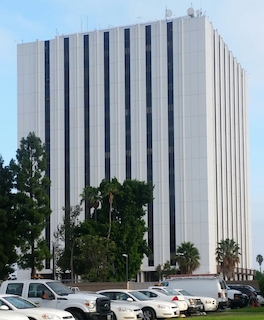Moore also was charged with and admitted one prior strike conviction under the Three Strikes law (Penal Code §§ 667(b) - (i), 1170.12(a) - (d)).
Judge H. Clay Jacke, who our office has appeared before many times and regards as an excellent judge, sentenced Moore under the Three Strikes law to an aggregate term of 107 years to life in state prison.
Twenty-three years later, in 2020, Judge Jacke denied Moore’s petition for a Franklin proceeding because Moore is ineligible for a youth offender parole hearing under Penal Code § 3051(h) because he was sentenced under the Three Strikes law based on his prior strike. People v. Tyris Lamar Franklin (2016) 63 Cal. 4th 261.
 Compton Courthouse
Compton Courthouse
As the reader may be aware, in 2013 the Legislature enacted Penal Code § 3051. Its purpose was “to create a process by which growth and maturity of youthful offenders can be assessed and a meaningful opportunity for release established.” To allow this, section 3051 “established a parole eligibility mechanism that provides a person serving a sentence for crimes that he or she committed as a juvenile the opportunity to obtain release when he or she has shown that he or she has been rehabilitated and gained maturity.” See In re Trejo (2017) 10 Cal. App. 5th 972, 980-981.
Under Penal Code §§ 3051(a) and (b), persons aged twenty-five and younger at the time of their controlling offense are eligible for a youth offender parole hearing after serving 15, 20 or 25 years in prison, depending upon the sentence.
However, Penal Code § 3051(h) specifically excludes from youth offender parole consideration offenders such a Moore who were sentenced under the Three Strikes law.
Moore appealed Judge Jacke’s ruling to the Second Appellate District Court of Appeal in downtown Los Angeles. Moore argued that Penal Code § 3051(h) was unconstitutional because it violated equal protection for its disparate treatment of offenders with a history of violent felony convictions and those without, who Moore claimed were “similarly situated” for purposes of his equal protection claim.
Under the Fourteenth Amendment to the United States Constitution and article I, section 7 of the California Constitution, all persons are guaranteed equal protection under the law.
The Second Appellate District Court began its analysis by explaining that to challenge a statute as violative of equal protection under a rational basis standard, the party just negate every conceivable basis for the disparate treatment. Heller v. Doe (1993) 509 U.S. 312, 320. Indeed, a classification does not violate equal protection if there is any rational relationship between the disparity of treatment and some legitimate government purpose. “If a plausible basis exists for the disparity, equal protection analysis does not entitle the judiciary to second-guess the wisdom, fairness or logic of the law.” People v. Edwards (2019) 34 Cal. App. 5th 183, at pp. 195 – 196.
Moore contended was is similarly situated to youth offenders who were not sentenced under the Three Strikes law and the differential treatment of youth offenders with prior strikes and those without under Penal Code § 3051(h) is not rationally related to any legitimate public interest.
The Second Appellate District disagreed, stating that the Legislature could rationally determine that the youth offender with one or more prior strikes is a recidivist who has engaged in significant antisocial behavior and who has not benefited from the intervention of the criminal justice system presents too great a risk of recidivism to allow the possibility of early parole, thus justifying the disparate treatment. People v. Wilkes (2020) 46 Cal. App. 5th 1159, at p. 1166.
Wilkes observed, “Numerous courts have rejected equal protection challenges to the differential treatment of Three Strikes offenders, concluding that such offenders are not similarly situated to nonrecidivist offenders and / or that a rational basis exists to treat them differently." Wilkes, supra, at 1165.
We bring this summary to the reader’s attention, but note that even someone like Moore is entitled to augment his court record with evidence of youth-related factors in mitigation under Penal Code § 1203.01 (and request the trial court exercise its power under Code of Civil Procedure § 187) for the purpose of making a record of mitigating and youth-related evidence. In re Cook (2019) 7 Cal.5th 439, at 446-447 (Cook was a habeas case, but the court there recommended 1203.01 as an alternative).
The citation for the Second Appellate District Court ruling discussed above is People v. Gregory Moore (2d App. Dist., 2021) 68 Cal. App. 5th 856.
For more information about Franklin Hearings and Youth Offender Parole Hearings, please click on the following articles:
 Compton Courthouse
Compton Courthouse